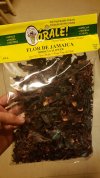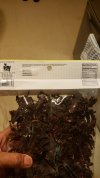Just purchased some dried Hibiscus flowers from Sam's club, a warehouse store in Baltimore MD. They were only $2.98 for a 8oz. bag, so while I was there I bought one 8oz. bag. Just wondering if they would be safe to feed my Sammy. Here are a couple of pictures, your opinions will help me decide if they are safe. They are sold for human consumption. If not safe, no big loss. But if they are good, I will have to buy a few more if he likes them for his winter treat.
You are using an out of date browser. It may not display this or other websites correctly.
You should upgrade or use an alternative browser.
You should upgrade or use an alternative browser.
Store bought Dried Hibiscus Flowers
- Thread starter Warren
- Start date
I personally wouldn't unless it was organic. Try @Kapidolo Farms they are organic and safe for tortoises. My opinion I am not an expert.
Thank you, I was thinking the same thing. That why I only bought 1. No big dealI personally wouldn't unless it was organic. Try @Kapidolo Farms they are organic and safe for tortoises. My opinion I am not an expert.
Even if it says organic, I'd be skeptical, but yea definitely not without that
Not sure why you wouldn’t feed “just cause it’s not organic“. There are plenty of organic things out there that can be toxic to your tortoise. Those bags of Hibiscus flowers (at Sams Club) are very safe & in fact are grown with human consumption in mind - hibiscus tea is great. If these were just sold as “non-food grade” flowers i could understand not using. But these are grown and meant to serve to humans.
Sorry, that's not what I meant. Its more that I wouldn't feed anything that I don't know where it comes from, and without the label of organic on a product like that, I'd just be MORE convinced its got pesticides or other crap in it. Not to say that organic means it is good, but just if it doesn't say that for a packaged item, i wouldn't do it. Even if it DID say Organic, that doesn't mean I would, either. But like if I buy greens, I feel more confident knowing they come from the organic farmer's market than the regular section of Kroger.
- Joined
- Nov 7, 2012
- Messages
- 5,172
- Location (City and/or State)
- South of Southern California, but not Mexico
Maybe think of Bill Burr as you read this...Just purchased some dried Hibiscus flowers from Sam's club, a warehouse store in Baltimore MD. They were only $2.98 for a 8oz. bag, so while I was there I bought one 8oz. bag. Just wondering if they would be safe to feed my Sammy. Here are a couple of pictures, your opinions will help me decide if they are safe. They are sold for human consumption. If not safe, no big loss. But if they are good, I will have to buy a few more if he likes them for his winter treat.
"safe" seems to mean many different things, at the low end of the range is anything produced for human consumption, at the high end is organic non-GMO. To be organic certified includes non-GMO but not the other way around.
Safe also seem to be interchangeable with 'appropriate' based on so many direct conversation I have with people. Like is chocolate safe for a dog. Well no it's not, even if it is organic chocolate. It messes with their liver real bad I have come to understand.
I have come to strongly dislike when people ask if a food is safe as it is such an inarticulate question. It takes a whole conversation to tease out what the question really is. And then with a pass/fail response you might get people feeding to much 'cause well it's safe'.
Which runs into that whole phucking 'it's only a treat' POV'. But I digress.
Hibiscus has a poor C: P ratio, so it's best attribute is a behavioral food. Tortoises clearly like bright red, I suggest it makes them 'feel lucky' to find a hibiscus blossom or some food that is bright red that has been mixed with it. I use it every few meals to colorize soaked grass pellets or other dried food, even the ZooMed diets. It is part of the ZooMed Gourmet natural tortoise food for the purpose of making that food more attractive. The C: P ratio can be balanced by feeding a high C: P food, so don't get to caught up on that but do the math a 2:1 is a bottom/minimum ratio, not the goal.
Warren, this all is not about you but the word safe. I understand why you ask, it's a common concern, but you are not the only one who asks this question. My response for the p[people who don't even bother to ask in the first place.
Rant over for now.
I want to thank everyone for their responses, to be on the safe side I will not be giving Sammy any of these flowers. Safe or not, he is attracted to the colors of flowers, I don't allow him to eat the day old flowers lying on the ground because they look spoiled.Maybe think of Bill Burr as you read this...
"safe" seems to mean many different things, at the low end of the range is anything produced for human consumption, at the high end is organic non-GMO. To be organic certified includes non-GMO but not the other way around.
Safe also seem to be interchangeable with 'appropriate' based on so many direct conversation I have with people. Like is chocolate safe for a dog. Well no it's not, even if it is organic chocolate. It messes with their liver real bad I have come to understand.
I have come to strongly dislike when people ask if a food is safe as it is such an inarticulate question. It takes a whole conversation to tease out what the question really is. And then with a pass/fail response you might get people feeding to much 'cause well it's safe'.
Which runs into that whole phucking 'it's only a treat' POV'. But I digress.
Hibiscus has a poor C: P ratio, so it's best attribute is a behavioral food. Tortoises clearly like bright red, I suggest it makes them 'feel lucky' to find a hibiscus blossom or some food that is bright red that has been mixed with it. I use it every few meals to colorize soaked grass pellets or other dried food, even the ZooMed diets. It is part of the ZooMed Gourmet natural tortoise food for the purpose of making that food more attractive. The C: P ratio can be balanced by feeding a high C: P food, so don't get to caught up on that but do the math a 2:1 is a bottom/minimum ratio, not the goal.
Warren, this all is not about you but the word safe. I understand why you ask, it's a common concern, but you are not the only one who asks this question. My response for the p[people who don't even bother to ask in the first place.
Rant over for now.
My first point is that those aren't flowers. Those are calyxes. More specifically, those are the dehydrated skins that once covered the seed pods that formed at the base of a fertilized flower. This is the stuff, these calyxes, that hibiscus tea is made from. This plant has many common namesand several cultivars, and it gets quite confusing but it is also know as rosella, African hibiscus, hibiscus sabradiffa, and several others. This is not the "traditional" normal hibiscus that most people think of when you say "hibiscus" to them. This is not the hibiscus seen in floral shirt prints and car window stickers. Hibiscus tea is not made from the flowers of the traditional hibiscus plant. Hibiscus tea is made from the calyx of this African hibiscus plant. In the live plant, the calyx is much like a succulent, and tortoises LOVE them. I grow several bushes of this stuff annually, and it is one of the few foods I've seen that tortoises will eat the first time they ever see it. They like the leaves of these plants more than Mazuri or any other favorite. What is contained in that bag is dehydrated calyxes. These are an excellent addition to your tortoise's diet. There is nothing wrong with it, and it does not need to be certified organic for it to be safe and/or good for our tortoises.I want to thank everyone for their responses, to be on the safe side I will not be giving Sammy any of these flowers. Safe or not, he is attracted to the colors of flowers, I don't allow him to eat the day old flowers lying on the ground because they look spoiled.
Day old wilted flowers on the ground are fine for tortoises to eat. Mine eat that sort of thing almost daily under my lavatera bushes.
Don't let that bag go to waste. That is good stuff right there!
Here it is "in the flesh":
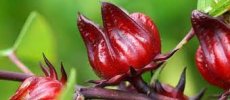
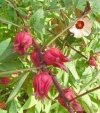
And here is the fleshy succulent calyx with a seed head showing. Once the seed heads dry out, I collect my seeds for the next year, and feed the dried up wilted, sometimes disintegrating, calyx to my tortoises.
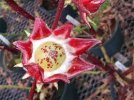
Lots of good pics showing this if you do an image search for "African hibiscus calyx".
If it’s advised wait six or so months to give a tortoise flowers or leaves from a plant you buy at a nursery to make sure there’s no lasting impact of fertilizers or insecticides, why would you trust packaged flowers or any plant part from an unknown packaging/manufacturing source?
Its 12 months. Decorative plants are grown with systemic pesticides that are assimilated into the plants tissues and last for 12 months.If it’s advised wait six or so months to give a tortoise flowers or leaves from a plant you buy at a nursery to make sure there’s no lasting impact of fertilizers or insecticides, why would you trust packaged flowers or any plant part from an unknown packaging/manufacturing source?
The plant that is the subject of this thread is NOT a decorative plant. It is grown and intended for human consumption. "Hibiscus tea". As such, it is not grown with systemic pesticides, just like every other food plant isn't.
Its 12 months. Decorative plants are grown with systemic pesticides that are assimilated into the plants tissues and last for 12 months.
The plant that is the subject of this thread is NOT a decorative plant. It is grown and intended for human consumption. "Hibiscus tea". As such, it is not grown with systemic pesticides, just like every other food plant isn't.
Non-organically grown food plants can be grown with systemic pesticides.
That may be true, but these would be deemed safe for human consumption, in contrast to the pesticides used in decorative plants.Non-organically grown food plants can be grown with systemic pesticides.
Organic doesn't mean it was grown without pesticides.
